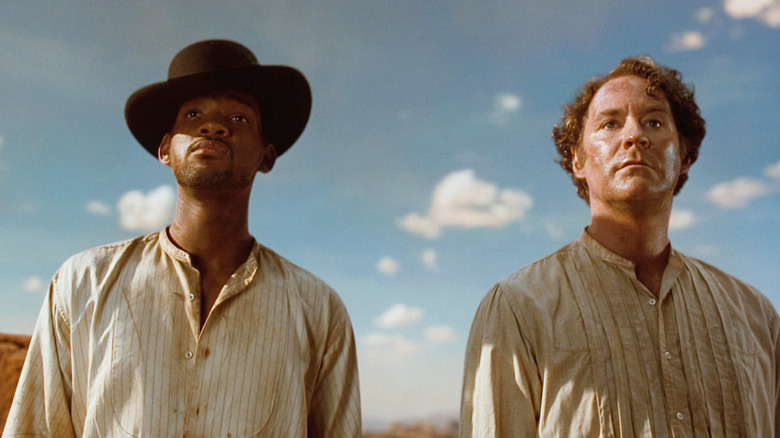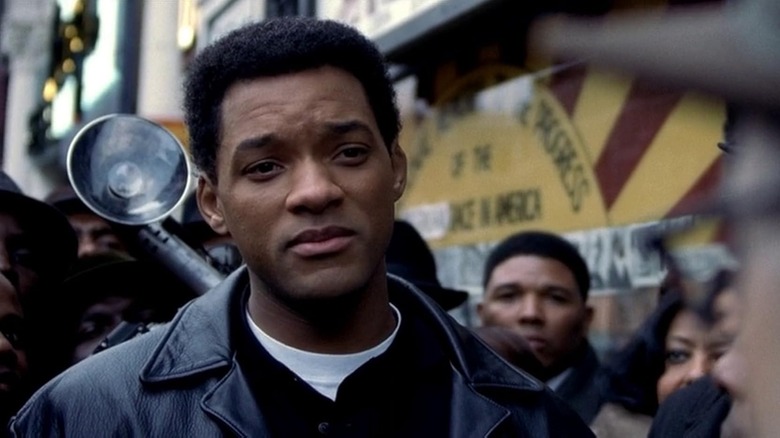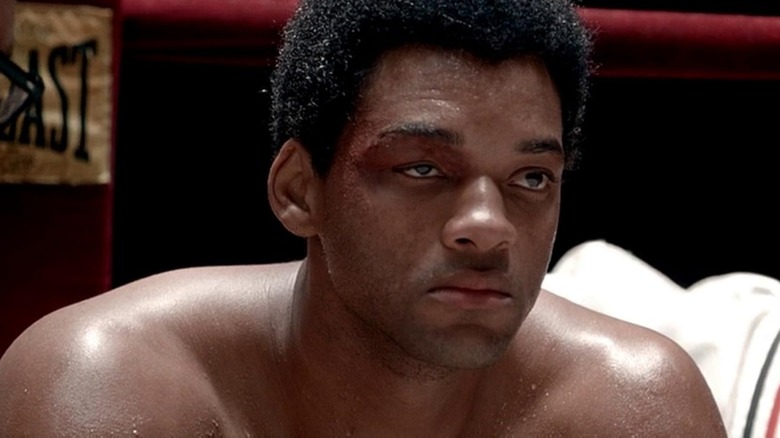A Box Office Flop Ensured Barry Sonnenfeld Couldn’t Direct Will Smith’s Ali
We may receive a commission on purchases made from links.
According to Barry Sonnenfeld’s new memoir, “Best Possible Place, Worst Possible Time,” the director, cinematographer, and producer once convinced Will Smith to sign onto the Muhammad Ali biopic “Ali,” the movie that earned the actor his first Oscar nomination — only for Sonnenfeld to have the opportunity to direct the film pulled out from under him in the wake of an infamous flop.
You may know Sonnenfeld’s work from stylistically singular TV shows like “Pushing Daisies,” “A Series of Unfortunate Events,” and the musical comedy series “Schmigadoon!” You might also know him as the director of zeitgeisty family films including two “The Addams Family” features and three “Men in Black” movies. Unfortunately for Sonnenfeld, though, for a time Hollywood knew him best as the director of one of the worst cinematic misfires of the ’90s: the Smith-led neo-Western “Wild Wild West.”
For years, “Wild Wild West” was the name used as shorthand for a major box office flop. The 1999 steampunk action-adventure flick had a then-exorbitant budget of $175 million (not including marketing costs), but only went on to earn roughly $221 million at the global box office, including $113.8 million in North America. In his book, Sonnenfeld is blunt about the movie’s shortcomings and how it cost him the chance to make “Ali” with Smith. “‘Wild Wild West’ was a disappointment. It wasn’t a good movie,” Sonnenfeld wrote. “Although it grossed a quarter of a billion dollars, that was just OK money for 1999. It was an expensive critical and box office failure. It won five Razzies. It was not the movie any of us intended to make.”
Before Wild Wild West, Sonnenfeld was set to make Ali
Despite losing the “Ali” job, Sonnenfeld noted he was still paid for the work he did on the film, primarily getting Smith on board. He also recalled meeting Muhammad Ali himself while Sony was optioning the script as Sonnenfeld’s next project, and the director had nothing but love for the famed fighter. “There was a beatific aura emanating from Ali, and just shaking his hand filled you with a peaceful feeling,” Sonnenfeld wrote. In addition, the filmmaker revealed Smith initially turned down the offer to play the fighter, insisting, “I can’t do better than the real thing.” Sonnenfeld reasoned that a fictional movie with Smith as the star would get a lot more eyes on it than documentaries like the Oscar-winning “When We Were Kings,” but it was ultimately Sonnenfeld’s wife Susan who got Smith to sign onto the project.
“Ali is Jesus,” Sonnenfeld recalled Susan telling Smith in a last-ditch attempt to convince him to play the Muslim boxer. She explained: “His government, religion, even his body turn against him and through it all, the man radiates peace and kindness. There’s an important story to be told and someone will play this part. Don’t you want it to be you?” After Susan’s passionate pitch, Smith finally signed on, much to the excitement of industry exec Amy Pascal, who Sonnenfeld said was by then already running Sony’s motion picture division behind the scenes. He remembered Pascal jumping on the couch when she heard the news, screaming about the movie’s Oscar chances. After the Warner Bros.-distributed flop “Wild Wild West,” though, Sonnenfeld reckoned that “Amy Pascal knew the smart money was on Will, not me.”
Sonnenfeld thinks Spike Lee’s name was also in the mix
“Ali” itself wound up becoming a box office bomb and was only nominated for two Oscars –- not exactly a couch-jumping number. Nevertheless, the Michael Mann-directed film was embraced by some critics and is still considered a high point in Smith’s career by many. Importantly, Ali himself seemed to approve of Smith’s intense portrayal, telling Oprah Winfrey in a 2001 “Oprah” appearance (via The Hollywood Reporter): “He scared me.” In the same interview, Ali said the experience of getting a biopic about his life inspired “a humble feeling” in him. 15 years later, when Ali died, Smith was among the pallbearers at his funeral, which was reportedly attended by thousands of fans and loved ones.
Sonnenfeld’s book is packed with interesting details from his decades-spanning career, and he closed out the section on “Ali” by noting that he thought –- but couldn’t officially confirm -– that Smith initially wanted Spike Lee to direct the film after Sonnenfeld was fired. That didn’t happen either, though it’s interesting to imagine what that version of “Ali” might have looked like. In the end, Sonnenfeld seems to harbor no ill will towards everyone involved, praising Smith’s performance and concluding, “I doubt I could have directed those fights as well as Michael Mann.”

















Post Comment